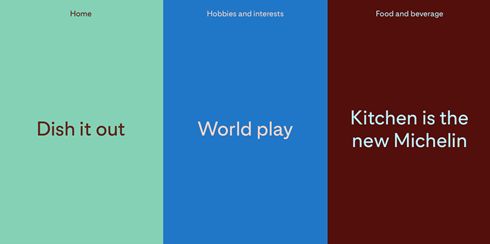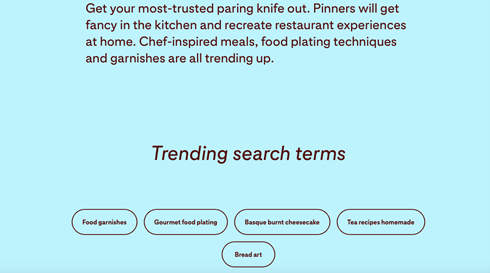Pinterest has seen a surge in revenue and monthly active use as the platform continues to build its audience and add features to help marketers connect with Pinners. The platform, which currently has almost 17 million users in the UK, offers brands the opportunity to shape and inform consumers decisions early in the planning process. People use Pinterest for inspiration on what to do, plan, or buy next and for this reason consumers are open to hear from brands on the platform.
Over the past year we’ve seen Pinterest pivot to take a bigger bite of the social commerce pie. The platform reported that “Shopping ad revenue grew faster than our overall business and we saw a 6x increase in the number of businesses that used the shopping ads format in Q4 2020’. The opportunity for brands to achieve growth through the platform has never been greater. With that in mind, we’ve summed up some of our key takeaways for success on Pinterest.
Tap into the discovery mindset
80% of Pinners have discovered a new brand or product on Pinterest. People visit Pinterest to plan; whether that’s for their dream home, wedding or simply what they want to cook for dinner. Because they are in the discovery mindset, consumers are open to brands – this gives marketers the opportunity to reach audiences early in the consumer journey. With the vast majority of searches on the platform being unbranded it’s important to research key search terms that align with your brand.
Drive consumers from inspiration to action
Unlike other leading social platforms, on Pinterest you are not competing with personal moments from friends and family so it’s important to have bespoke strategy for the platform. Does your content inspire people to go from inspiration to action? If it doesn’t, Pinterest is probably not the best fit for your brand.
Seasonality is huge
When considering your Pinterest strategy it is essential to understand the motivations of the consumer. Consider when and why your audience may need your product or service and develop an advertising and content strategy based on these needs.
The three key trigger points to plan around are Seasonality (Spring Clean & Summer Vacation), Life Moments (Moving house, having a baby) and Everyday Life (How can I organise my wardrobe?). Aim to plan 3 months ahead of key dates in order to meet search demand. Remember the discovery mindset; your content and advertising needs to be live when consumers are in the planning stage.
It’s worth referencing the Pinterest Predicts report to gain insight into predicted trends across a wide variety of industries. By understanding what is likely to be a high traffic search term in the year ahead, you can build your organic content strategy to hijack popular search terms.


Be brand proud
People who use Pinterest want to bring their ideas to life so they tend to be more receptive to relevant brands and advertising. Don’t shy away from being clear about what your brand can offer, ensure your logo features on Pins alongside a strong call to action. Remember your content should be vertical format, horizontal content will automatically get demoted.
Consider Pinterest for higher consideration purchases
Pinterest is an ideal platform for higher consideration purchases, rather than impulse buys. To fit with Pinterest, the consumer journey to conversion for your product or service should typically involve a planning and exploratory phase.
A solid organic strategy will enhance paid media
The lifespan of organic content on Pinterest is typically much longer than on other social platforms. It’s common that Pins that are months old will perform just as well as recently posted content. As such it’s worth investing time into your organic content as this will naturally improve the performance of paid advertising.
If you’re interested in finding out more about how achieve business growth through Pinterest, contact our team.






